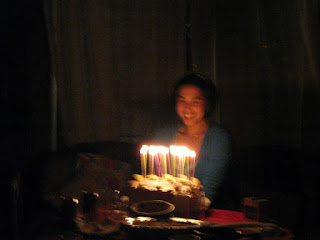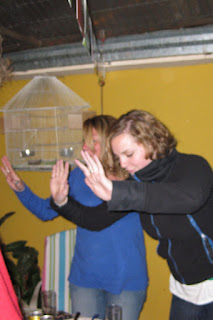Six months have come and gone, but not without proper goodbyes from every corner of my little life in Chile.
 Goodbyes at La Aurora de Chile
Goodbyes at La Aurora de ChileThe last week of teaching was nearly impossible. Every day children would spend their recesses latched onto my legs or holding my hands with sticky fingers. They gave me curious little presents: a (potential) voodoo doll (maybe that was why I was sick 3 of 6 months?), action figures, heart-shaped notes, stickers, used lip gloss, home made hemp bracelets, and lots of candy. In return, I gave them copies of pictures and wrote
recuerdos on the back of each one. With hand cramps and words failing me, I was relieved when I ran out of pictures and could resort to hugs.

On the last day the teachers surprised me with an
acto or an hour of children singing, dancing, reading poems, and eating cake. I looked around the school patio and realized I had a huge family. There are over 800 children at Aurora de Chile and I hugged and kissed each one at least three times.
Walking out of the big blue gates, I turned around to look at the bright yellow school once more. The seventh graders saw me, leaned out their classroom window, and shouted at me wildly. I blew them one last kiss and kept walking.
Goodbyes at Home
After saying goodbye to my students, leaving my host family was next. My mamita. I measured her and decided there is a possibility she could fit in my suitcase. But if that doesn't work, how will I ever leave her? She is my family and my life has changed in the presence of her warm heart and open arms.


My host mom was set on spending Christmas together, so on friday night we had a secret Santa gift exchange. Imagine Santa in swimming trunks and sunglasses and you can understand that the concept of a "white Christmas" is foreign to Chile. Despite the heat, the volunteers and some host families gathered for a premature Christmas celebration.

By now we knew each other by heart and could pick out perfect gifts: a fanny pack for Scott, a silver stallion for Kelly, jewelry for Cami, jewlery for Laurel, a wallet for John, cooking supplies for my host mom, an Aerosmith cd for Niko, and wine for me. SUCCESS!

 Bottle Shop Blues
Bottle Shop Blues
Friday passed in good spirits, but Saturday was a messy adventure. When my host mom and I left to get pedicures, life was normal. But when we returned with shiny nails from our mother-daughter bonding, chaos had broken.

Estranged family made a surprise visit to Rancagua, but they refused to visit my Aunt Isabel. Apparently someone had wronged someone else at a wedding three years ago and the two parties haven't spoken since.
Now, readers should be aware that my Aunt Isabel seems to attract drama, but not in a catty desperate housewives way. Isabel is 4 ft 11, 100 pounds, with a deep smoker's rasp, and grey hair. She cares for a 22 year old boy named Felipe who was mentally impaired after contracting menangitis as an infant. Her life revolves around Felipe and the bottle shop where she works 60 plus hours a week.
Earlier this summer she was robbed and beaten at the bottle shop. Later, she had surgery for an ulcer. Soon after, Felipe had a heart attack and her son, Rene, had surgery for a vague stomach problem. She has been through a lot the past three months and we presently find her in a serious depression.
With her depression as bait, my host mom and brother managed to pursued the new family to visit her, to forgive, to forget. So we left for Isabel's. At Isabel's there were tears, some bickering, and the relief of long lost embraces.
Amidst all the emotions, my host mother blurts out: I know what would make everyone feel better. A weed cake!
Me: You have weed?
Host Mom: Yeah, I have it at home. It's in your closet actually.*
Me: Huh. Interesting.
Host mom: I'll go get it.
Isabel: No, you don't have to. I have some right here, but I don't know what to do with it.
Isabel pulls a bundled tissue from her pursue and unwraps a bag of weed. My host mom picks at it, pulling out "the good parts." Meanwhile, I rapidly text Laurel because I find the situation unbearably hilarious.

As Isabel has not eaten more than scraps of bread in days, my host mother urges Isabel to eat dinner first. We walk to the bottle shop where I help Rene grill some
cuchifli (pork meat kabobs) outside. While I wonder where I am and how I got there, the whole family is laughing and dancing around the bottle shop. Maybe they didn't wait to "feel better" until eating after all. Crazy Chileans. I will miss them.

*My host mom is what I like to call a "witch" doctor. She can cleanse people through meditation techniques, herbal remedies, and of course her touch. She can also predict the future, but I can not testify to her abilities.















































